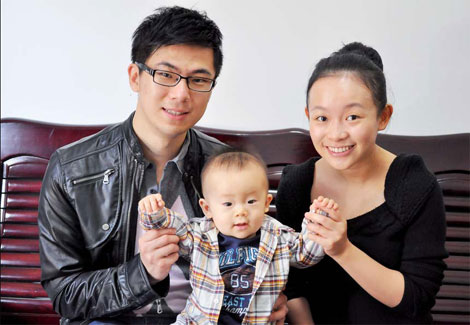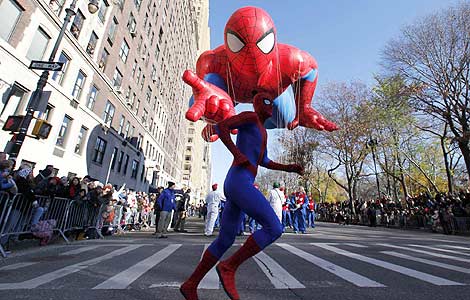Four-letter names
Updated: 2011-11-25 07:35
By Chen Yingqun (China Daily)
|
|||||||||
|
Zheng Zhiliang (left) and Cheng Tianheng named their boy Zhengcheng Yunjia, which has four characters. Provided to China Daily |
More characters become a naming trend for new generation of young parents
The moment Cheng Tianheng learned about her pregnancy she and her husband Zheng Zhiliang began wracking their brains about naming their baby. After about nine months of struggle, they finally chose a four-character name: Zheng cheng Yunjia (郑程玧加).
Cheng explains its special meaning. "This name contains both my husband's family name Zheng and my family name Cheng," the 24-year-old mother says.
"Yun and Jia mean the baby's birthplace and ancestral home. At the same time, the name is melodious and sounds beautiful."
According to experts, four character Chinese names have become a new trend for young parents born in the 1980s under China's one-child policy.
Since most of them are the only child of the family, they want to retain both their family names.
"We both wanted to give our baby our family names, because we were both only children and as a woman I especially wanted my family name to live on," Cheng says.
Naming patterns in China continually change and the four character name follows a previous trend in which parents named children after big events, like the Beijing 2008 Olympics.
According to the National Citizen Identity Information Center about 31,000 children have been named Shen'ao (bidding for Olympics) or Aoyun (Olympics).
"Names are not only symbols that help differentiate people, they also reflect the characteristics and changing times," says Wang Daliang, a noted researcher on Chinese names.
"Every decade a new batch of names is selected by parents that reflect that era."
Personal names in China are different compared with Western cultures, with the family name coming first followed by the given names.
Most Chinese family names have only one character, while given names generally have one or two.
In ancient times after a child was born the family would first go to the ancestral temple and burn joss sticks in a tribute to their forefathers. Then the child's father, or grandfather, or some knowledgeable person in the clan, would name the child according to his or her offshoot and connection to the family.
There were about 20,000 family names in ancient times, but now there are only about 4,000, Wang says. However, only about 100 family names are used by 85 percent of the population, he says.
The top 10 most commonly used family names are: Wang, Li, Zhang, Liu, Chen, Yang, Huang, Zhao, Wu and Zhou.
Traditionally, Chinese women adopted their husband's family names after marriage. But since the founding of the People's Republic of China in 1949 women have kept their maiden names.
During different historical periods, the art of naming followed different principles.
During both the Han dynasties (206BC-220), a prosperous period in Chinese history, many people wanted to contribute to the welfare of the country and named their children accordingly to reflect that spirit and wish.
For example, popular names included Anguo (secure the country), and Dingguo (make the country stable).
In the Southern and Northern Dynasties (AD420-581), many people believed in Buddhism and liked to incorporate characters that were closely related to religion.
Names like Seng (monk) and Hui, (a mind that perceives both past and future) were popular.
Given names with two characters became popular in Song Dynasty (AD420-479) and these two traits have been handed down to modern times.
There are also many taboos when naming a Chinese baby. "In the Zhou dynasties, the noblemen would not name their children with characters related to seven categories: countries, official positions, the sun and the moon, mountains, animals, appliances and silk," Wang says.
Unlike in Western cultures, Chinese people did not name their children after a relative or the names of famous people, but the names of national heroes did become special symbols for society. For example, when people think of the name Lei Feng (a Chinese icon who went out of his way to help others), they think about someone who is always ready to be of service.
As for Zhuge Liang, a great strategist in the Three Kingdoms period (AD220-280), the name has become a symbol for intelligence.
"Chinese people were quite particular about names in ancient times, but in modern China many parents were a little bit irrational about naming," says Wang Haohua, president of the Chinese Name Culture Research Association.
With the rapid growth of the population over the past 50 years, and the limited list of family names to choose from, modern parents have had a challenge coming up with a unique name, Wang says.
"People from today's generation share the same thoughts of individuality and when every parent has the similar wish to give their child a unique name, the situation gets more serious," he says.
Sixty years ago naming a child was much easier, Wang says. To express their love for the new era, many parents named their children Guoqing (celebration for the founding of new China), Jianguo (the founding of new China), and Jiefang (liberation) during 1949 to 1966.
From 1966-1976, names like Hongwei (red guard) and Wenge (cultural revolution) were popular, as many people wanted to state their political stand and express admiration for the Red Guard (students and young people mobilized for implementing the goals of the "cultural revolution" (1966-76)).
In the 1980s, people opted for simplicity and given names with just one character were all the rage.
From the 1990s, giving children names that wished them a safe and sound future became a trend. "Parents want the name to include blessings for every aspect of their children's life, like career, health, wealth and family," Wang says.
In the pursuit of the unusual, some parents also used highly unusual characters.
"Actually, good names will never be able to change one's life, they can only symbolize beautiful wishes," Wang says. He says some Chinese people, undecided about the right name, go to businesses that specialize in names.
In Beijing, there are about 1,500 naming companies, and the prices for naming a child range from 100 yuan ($15.4, 11.7 euros) to 10,000 yuan, according to their different levels. Apart from naming babies, they also serve people or companies that want to change their names.
According to Wang Haohua, China had about 10,000 naming companies in 2006, but the number has fallen to 3,000. He believes that in five years, the number will fall to less than 1,000, as the market becomes more regulated.











